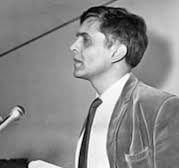Eqbal was a multitude of men — scholar, activist, political analyst, teacher, diplomat, visionary — but, above all, a foot-soldier in the army of peoples everywhere. Others have written about Eqbal in Algeria, Eqbal in Pakistan, Eqbal in Palestine, Eqbal in Iran, Eqbal in the US Civil Rights Movement of the ’60s and the anti Vietnam war movement of the ’60s and ’70s. But little is known of how in 1973 Eqbal rode into Europe and, scouting through France, Germany, Denmark, Sweden and Britain, gathered to himself and to the Transnational Institute (TNI) in Amsterdam (which he set up as an independent wing of the Institute of Policy Studies in Washington) a clutch of organic intellectuals and activist groups, given to the fight against imperialism and the struggles of liberation movements, and gave them the where withal and the fillip to pursue their commitments and broadcast their visions. And he brought them together in seasonal seminars and conferences to exchange views, ideas and programmes, and in ad hoc pressure groups to arraign and harry governments. In the process, he created a floating university which fostered a left culture free of petty sectarianism and an academic ethos free of self-aggrandisement. Into European considerations he brought a Third World dimension, into American considerations both European and Third World.
In Race & Class, Eqbal saw a journal of political intervention, which reflected the symbiosis between thinking and doing that he himself so uniquely exemplified, and promptly made it his responsibility, with TNI as its co-sponsor and me a fellow of TNI. His assistance came at a time when the Institute of Race Relations staff, having taken over the Institute and its periodical, Race, in the palace revolution of 1972, were unable to sustain either through lack of funds and contributors. Eqbal provided both to see us through our critical rebirth as Race & Class – and, then, as joint editor, took the journal to new heights in its special issues on Iran, Palestine and Lebanon, establishing thereby its reputation as the best Third World quarterly in the English-speaking world.
This journal is a monument to his memory.
